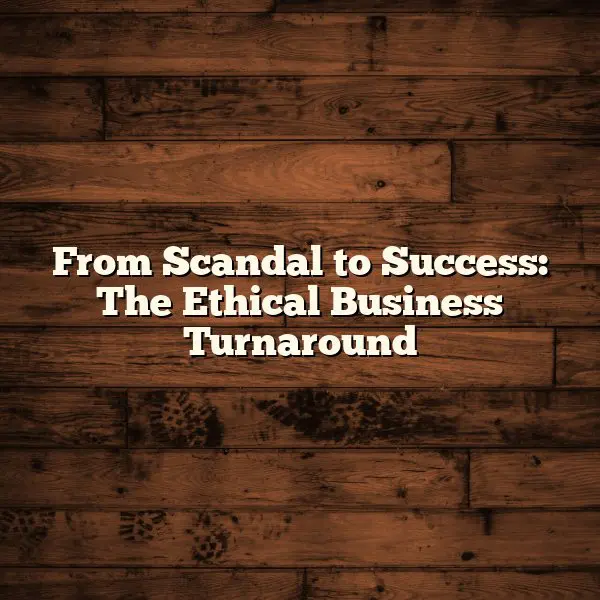From Scandal to Success: The Ethical Business Turnaround
Major corporations worldwide are realizing the significance of ethical business practices in building a sustainable future. Time and again, companies that cut corners often find themselves in scandals and losing customer trust. However, for many, a scandal can serve as a wake-up call, an opportunity to turn the tide and recover lost goodwill. In today’s world, where ethical accountability and transparency are vital for organizational success, let’s take a look at some of the companies that have turned their scandals into success stories and how.
Turning Scandals into Success
In recent years, many companies have faced the consequences of unethical business practices. However, instead of letting the reputation damage cripple business growth, several corporations have taken measures to combat the crisis. For example, after their 2013 Rana Plaza factory collapse in Bangladesh, killing over 1,000 people, fast-fashion retailer, Primark, became the first company to pay compensation to the families of the victims. In the aftermath, they partnered with stakeholders across the industry to establish ethical practices and to improve worker safety conditions.
Another scandal that highlighted the importance of ethical practices to business survival was Volkswagen’s 2015 emissions scandal. In response, Volkswagen pledged to overhaul its internal governance structure to ensure such deliberate actions could not happen again. The company committed to transitioning towards a more sustainable future, with one goal being to provide enough clean energy to support all production plants by 2025.
Creating an Ethical Business Model
With consumers and investors problematizing unethical behavior, the adoption of ethical business models has become a top priority. This strategy embraces a holistic approach by placing equal importance on social, environmental, and economic sustainability. Patagonia is a prime example of a company that boasts an ethical business model by ensuring that its practices are environmentally and socially equitable. The outdoor clothing and gear brand has earned a reputation for its ethical manufacturing practices, fair labor, and environmental conservation efforts.

Ethical Business FAQs
What is ethical business?
Ethical business is the practice of conducting business activities in a morally and socially responsible manner. It involves adhering to principles that ensure respect for human rights, environmental sustainability, and fair labor practices.
Why is ethical accountability crucial for business success?
Ethical accountability translates to greater consumer and investor trust, improved brand reputation, and increased profitability. Being an ethically accountable brand builds strong customer relationships and instills confidence in investors.
What are the benefits of an ethical business model?
The benefits of an ethical business model include a positive public reputation, consumer trust, and investor confidence. Ethical business models can also yield increased employee satisfaction and loyalty, reduce risks of legal liabilities, and foster sustainable practices.
Conclusion
In an ideal marketplace, all businesses could thrive without exploiting human or environmental resources. However, in reality, the allure of profit can drive some companies to unethical practices. The success stories of companies that found a way out of scandals and applied ethical practices demonstrate that a company’s sustainability is interlinked with the health and wellbeing of the planet and society.






